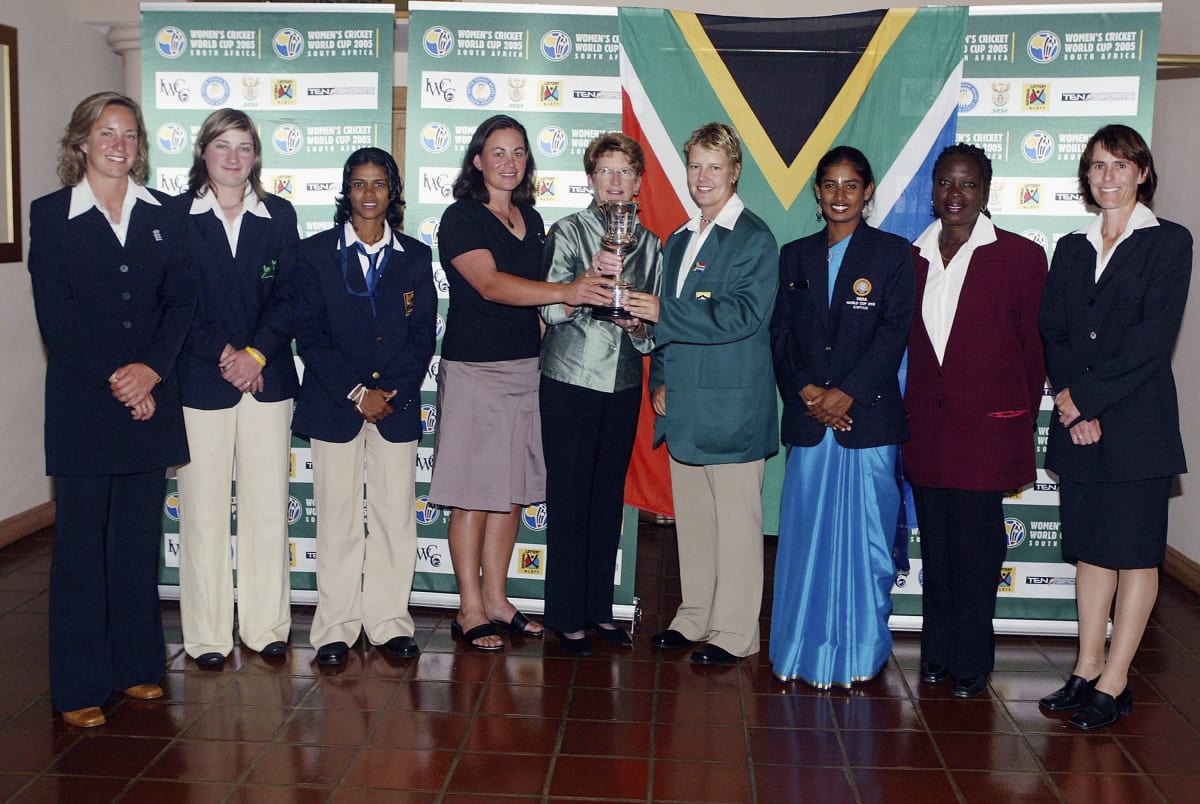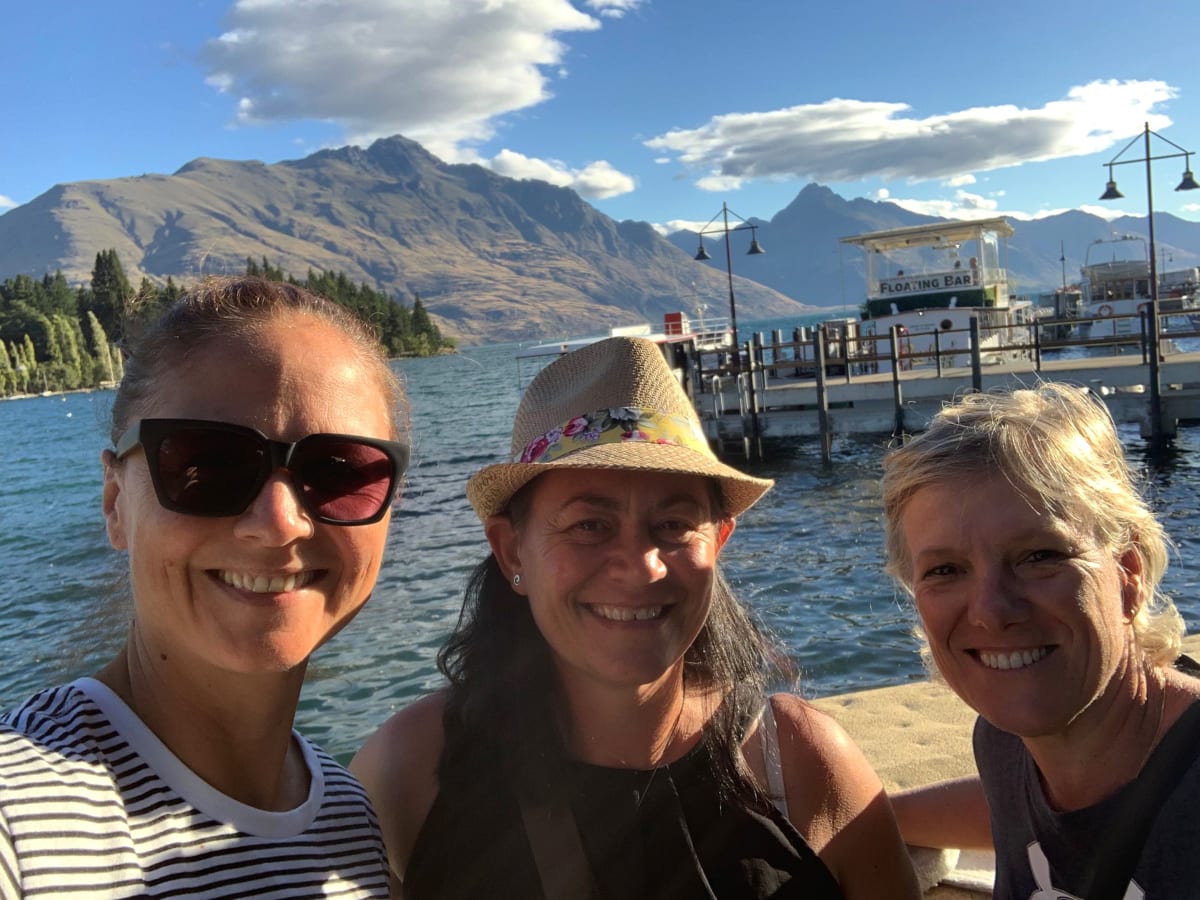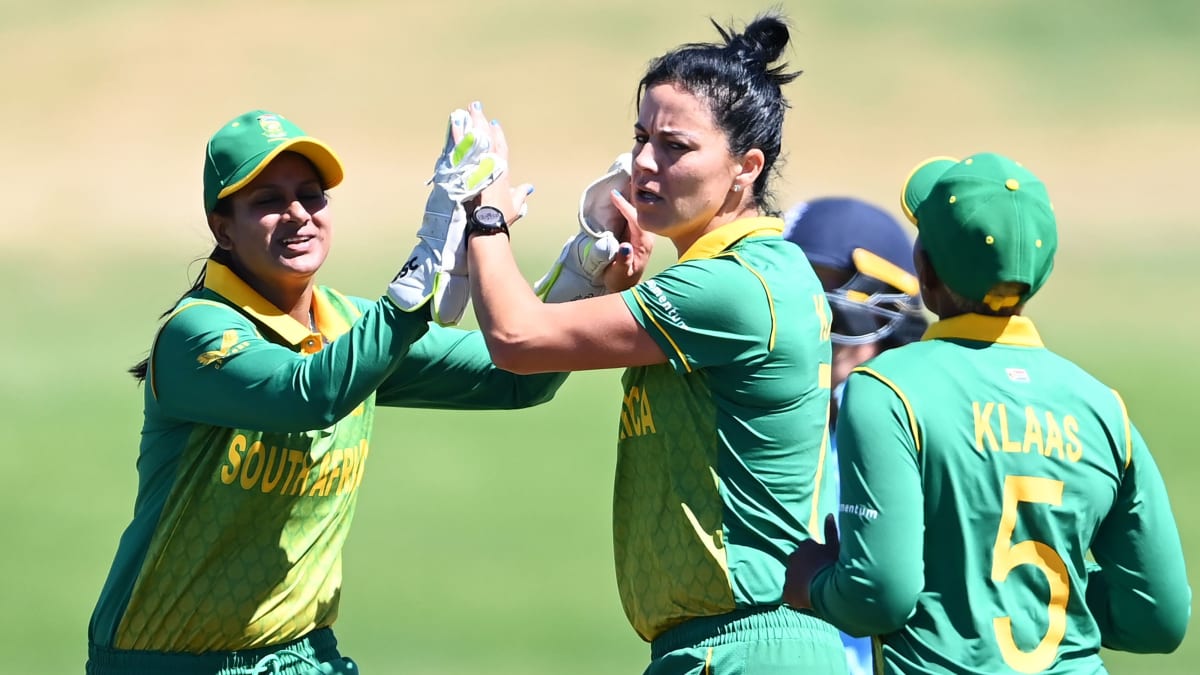
She’s played in three World Cups, now former White Ferns captain Maia Lewis is calling the shots in a different way at the latest tournament on home turf.
Maia Lewis sits in one of the hottest seats at the Cricket World Cup.
Perched in a tent on the edge of the field, right next to the corridor where the batters march out (and usually return with their eyes downcast), Lewis broadcasts all the action through loudspeakers around the park.
The former White Fern captain is a ground announcer at many of the 31 World Cup matches being played around New Zealand - and she’s in her element.
“I’m lapping up being in the hot seat, being able to see everything,” the 51-year-old says. And hear everything, too. Leather on willow, the squeals of joy at a batter's golden duck; the exaggerated appeals for a leg before.
And it’s not just the adrenalin rush of MCing a world sporting event for Lewis. As a cricket coach, she also gets a unique insight into how the best teams in the world work.
“It’s the perfect view,” she says.
This is Lewis’ fourth World Cup, but the first she isn’t playing in. Yet she’s still making her mark on the tournament.
“I’m putting my own spin on things, with a bit of Māori content,” says Lewis, who is Ngāti Whātua and Ngāti Maniapoto, and studied Te Reo at university.

The tournament organisers have made an effort, too, in what's understood to be the first World Cup where the host nation's indigenous language is shared on the scoreboard. A boundary flashes up on the screen as FOUR then WHĀ; a wicket is signalled with WĪKITI!
“I also include little things like ‘Please be upstanding, if you are able, for the national anthem’. I’ve never heard anyone say that at a sportsground before. I’ve had my friends in wheelchairs next to me sometimes and I’ve thought ‘It’s such a bummer for them’,” Lewis says.
“I’ve always been fighting for the underdog. For women’s cricket, for women’s sport and disability sport.”
The triple New Zealand representative (in indoor and outdoor cricket, and hockey) is no stranger to championing diversity. She’s coached the first Samoan women’s XI and the New Zealand BlindCaps, and was a disability advisor for the Halberg Foundation.
“I love seeing the underdog come through – it’s the most rewarding thing for me.”
Lewis was ringside at Bangladesh’s first ever World Cup victory, over Pakistan in Hamilton on Monday. On Tuesday morning, she was back in Auckland at her day job, as korikori (movement) schools and kura manager at CLM Community Sport, supporting tamariki and rangatahi in Counties Manukau to play sport and be active.
This weekend, she’ll call the shots at two matches at Eden Park, including the White Ferns' clash with England on Sunday.

She doesn’t miss being out in the middle (“My body is so bad now – I didn’t do enough stretches when I was playing”).
But she marvels at how much more professional the game is and how much more athletic the players are, since she turned out for New Zealand in the 1993, 1997 and 2005 World Cups.
If there’s one thing that still chafes for Lewis, it's that she skipped the only World Cup New Zealand has ever won, at home in 2000.
“It’s all a bit gutting for me, but it was through choice,” she says. In 1998 she tore her ACL, playing club rugby in Wellington stepping on uneven ground, and then lost her motivation to play cricket again.
She moved to Northland and “got away from it all”. But then she got a call from Robbie Kerr – father of White Ferns sisters Jess and Melie Kerr – which spurred her to make a comeback.
“Robbie was the Wellington Blaze coach, and he said: ‘You’ve still got so much to offer’. If he hadn’t asked me, I wouldn’t have come back,” says Lewis, who became the Blaze captain.
“He’s still a mentor to me, and we talk about life things. His daughters are just amazing; they’ve got the real, down-to-earth temperaments of Robbie and [mum] Jo in them. I have a special place for that family in my heart.”
Although she still regrets missing out on a World Cup victory, her experiences at three world championships were unforgettable.
In 1993, New Zealand played in the World Cup final against England, at the hallowed ground of Lords. “Playing at Lords was still quite rare for women at the time. So we were a little ground-breaking,” she recalls. Lewis was the top scorer (28) in New Zealand’s innings of 128, but they fell 67 runs short of victory. (She would later become the first Māori woman to be inducted at Lords.)
Four years later, Lewis captained the White Ferns to another World Cup final, this time against Australia. “We were playing at Eden Gardens in Calcutta, in front of 60,000 people,” she says.
“Everywhere we played in that tournament, there were crazy crowds. Security guards were with us everywhere we went. People were trying to nick our caps off our heads as we walked to the bus.
“They bused all these local women to the final, so it was massive - so colourful, so loud. All these women, but all behind cages. We don’t have cages in cricket!
“You felt like a popstar. So crazy.”
Lewis still disputes her dismissal that day. Coming to the wicket when New Zealand were 49/3, she was given out LBW on 10. “But I actually hit it,” she says (these were the days before third umpire reviews).
“I was just starting a partnership with Deb Hockley [who went on to score 79]. It was lucky we didn’t have stump cameras and microphones back then, because I swore as I walked off. I was so gutted.” Chasing a meagre 165, Australia won by five wickets.

Lewis again captained the White Ferns, who were this time defending champions, at the 2005 World Cup in South Africa. But the tournament was hampered by bad weather and small crowds.
Although Lewis was happy with the way she played – “No one wanted to open the batting, so I did” – New Zealand were knocked out at the semifinal stage by India. She finally retired when she came home, and was made a Member of the New Zealand Order of Merit the following year.
She has few regrets from her sporting career, including her decision to ultimately choose cricket over hockey despite making the Black Sticks in 1991.
“Hockey was huge for me and I could have gone either way. You know why I chose cricket? Because there was less running and fitness involved,” Lewis laughs.
“And I also would’ve had to work really hard to make the playing XI, because I was a workhorse. I knew I had more potential and talent to play cricket at the highest level.
“I’ve found cricket so character-building. I got a goldie [a golden duck] on my debut for New Zealand against Australia in 1992 at the Basin Reserve, which was my home ground at the time.”

She continues to be involved through coaching, and has worked with Auckland women’s club sides at Cornwall and Papatoetoe, the Samoan national side, the NZ BlindCaps, and NZ Maori secondary school side.
Now she’s assistant for the Northern Brave women to head coach, former Australian cricket star Jo Broadbent.
“I wanted to get involved in coaching again because of Jo; I’ve played against her heaps and I wanted to learn the Aussie perspective, what makes them so successful,” she says.
“It’s rejuvenated my coaching. I don’t necessarily want to go much further, I’m happy being an assistant coach and helping the next generation, bringing the academy girls through.” She’s already introduced young Samoan and Papatoetoe player, Carol Agafili, to the Brave's squad.
“The most rewarding thing for me is giving girls an opportunity, in any sport.”
Which is why she loves her job with the regional sports trust in Counties Manukau. A former high school teacher in PE and Māori, Lewis now leads a team of 10, who advise teachers on simple ways for kids to get active.
“It’s like I’m running a cricket team again - getting the best out of them and working towards a common goal,” she says. Two of the ‘connectors’ in her team are Black Stick Lulu Tuilotolava and Auckland Blues player Shyanne Thompson. “I can also use my sporting experience to help them negotiate being semi-professional. I’m getting huge reward out of that too,” she says.
She keeps active by playing tennis a few mornings a week with her work colleagues.
Lewis is also a proud mum to 15-year-old Elijah, who’s at Auckland Grammar, and although he’s played school and club cricket, has discovered a real passion for weightlifting. (His other mum is former White Fern Losi Harford).
Lewis will also be ground announcer at one of the semifinals and the final of this World Cup. She’s organised one of her best mates, 2000 World Cup winner Katrina Keenan, to be her “roving emcee”.
“On tour I’d play the guitar and she’d sing,” Lewis says. “So I’ve suggested that if New Zealand makes the final, Katrina could sing the English version of the national anthem, and I could sing the Māori version.”
So with two wins and two losses, can she see the White Ferns still making the final on April 3? Right now, they're fourth on the standings - behind Australia, South Africa and India - and ahead of West Indies on net run rate.
“If they get it all right on the day, they’ll be fine,” Lewis says. “Their batting order is right, and all the top order have had some form with the bat. I think Sophie [Devine] is a great captain, and I also think she should bowl.
“It’s such an open tournament. Australia are streets ahead of anyone else right now, and they’d need to have a bad day to lose the World Cup, but it could happen.”
MEANWHILE AT THE WORLD CUP:
Australia continued their unforgiving march towards the 2022 final, demolishing the West Indies by seven wickets at the Basin Reserve on Tuesday to keep their scorecard unblemished. Three wickets a piece to Aussie bowlers Elysse Perry and Ash Gardner, and an unbeaten 83 from Rachael Haynes, did the damage to the high-flying Windies.

Who would have thought defending champions England would be second-to-last on the table, after their third straight loss from three games? England coach Lisa Keightley is shouldering the blame for the losses - the latest to South Africa on Monday by three wickets, with four balls remaining. South African allrounder Marizanne Kapp was the star of the match, collecting her first five-wicket haul in ODIs, and 32 with the bat.
Now England have been leapfrogged by World Cup debutants, Bangladesh, who scored their first win in World Cup history. Up against Pakistan, the Tigresses' 234/7 included a patient 71 from Fargana Hoque, before their bowlers did the hard yards – including taking three golden ducks in the middle of Pakistan’s batting order.







